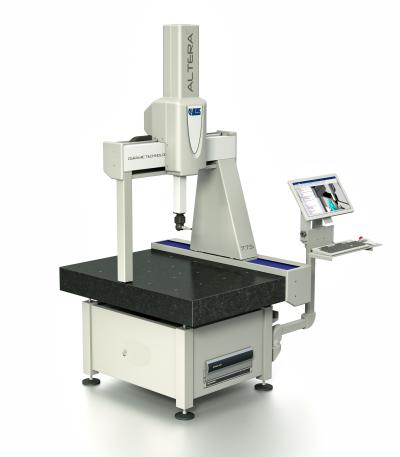
CMM manufacturer LK Metrology has designed a new, more efficient air bearing and carrier which are now being fitted as standard to its ALTERAC range of ceramic-bridge, multi-sensor CMMs. By significantly augmenting the pre-load on the structure, stiffness has been uprated without making the guideway thicker, leading to more precise motion control.
The results are higher measuring accuracy, whether a touch trigger probe or scanning probe is used, coupled with the possibility to increase speed of operation and hence raise inspection efficiency. The compact ALTERAC machines, which are available in three sizes with measuring volumes of 700 x 650 x 500 mm, 1,000 x 650 x 500 mm and 1,000 x 650 x 650 mm, carry an unrivalled 10-year accuracy guarantee covering dimensional stability.
In terms of speed, all machines now accelerate at 1,900 mm/s2, representing an increase of 15% for the two smaller models and 20% for the largest model. Velocity is up by 38% across the product range to 720 mm/s. As regards accuracy, maximum permissible measuring error on all machines is now 1.7+L/333 µm when measurements are taken of a feature L millimeters in length between 18°C and 22°C, irrespective of whether a TP200, SP25, TP20 or PH20 probe is used. This performance represents length measurement accuracy improvements of 22%, 22%, 32% and 43% for the four respective probes, while maximum permissible probing error is also better and so also is repeatability of measurements by 15% when using a PH20.
Optimisation of the pre-loaded, wrap-around air bearing configuration was feasible due to the superior inherent rigidity of LK's high-performance ceramic guideway, which allows it to maintain structural integrity under extreme conditions. Offering 3.5 times higher stiffness than standard air bearings, they run with a reduced air film thickness for low energy consumption and give repeatable measurement results, even at fast axis speeds. Friction drives provide smooth motion together with exact positioning at continuously varying speeds, as well as zero backlash, overload protection and low maintenance costs.
Ceramic is 330% stiffer than aluminium yet only one-third heavier by volume, resulting in higher machine agility. Ceramic does not stress-relieve like aluminium, leading to superior long-term dimensional stability. The thermal expansion coefficient of ceramic, which is similar to that of granite but four times lower than aluminium's, makes the structure highly resilient to thermal movement. Moreover, ceramic is three times harder than aluminium, so is more resistant to abrasive wear and indentation.
ALTERAC CMMs are equally at home in an inspection department or on the shop floor, especially as pneumatic mounts isolate the machine well from nearby sources of low frequency vibration such as large machinery. The inclusion of Renishaw encoders with 0.05 μm-resolution optical scales offers high volumetric accuracy and immunity to the ingress of contaminants. LK’s powerful CAMIO DMIS-based, multi-sensor software enables programming and measurement based on 3D CAD data, as well as comprehensive reporting.
Contact Details
Related Glossary Terms
- abrasive
abrasive
Substance used for grinding, honing, lapping, superfinishing and polishing. Examples include garnet, emery, corundum, silicon carbide, cubic boron nitride and diamond in various grit sizes.
- backlash
backlash
Reaction in dynamic motion systems where potential energy that was created while the object was in motion is released when the object stops. Release of this potential energy or inertia causes the device to quickly snap backward relative to the last direction of motion. Backlash can cause a system’s final resting position to be different from what was intended and from where the control system intended to stop the device.
- computer-aided design ( CAD)
computer-aided design ( CAD)
Product-design functions performed with the help of computers and special software.
- metrology
metrology
Science of measurement; the principles on which precision machining, quality control and inspection are based. See precision machining, measurement.
- stiffness
stiffness
1. Ability of a material or part to resist elastic deflection. 2. The rate of stress with respect to strain; the greater the stress required to produce a given strain, the stiffer the material is said to be. See dynamic stiffness; static stiffness.
